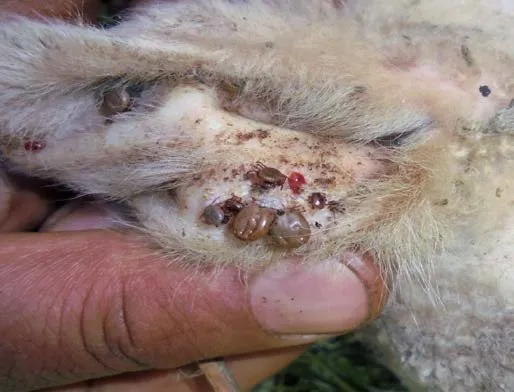Ticks
Ticks are small, blood-sucking parasites that can cause significant health issues in sheep. They are not only a nuisance but also vectors for various diseases. Understanding how to identify, treat, and prevent tick infestations is crucial for maintaining a healthy flock. Let's dive into the details! 🐑

Symptoms and diagnosis of Ticks 🩺
Symptoms
- Intense itching and irritation, especially on the head, ears, and legs.
- Visible ticks on the skin, often in areas not covered by thick wool.
- Weakness and anemia in severe cases.
- Potential transmission of diseases such as Louping ill, tick-borne fever, and tick pyaemia.
Diagnosis
Ticks can be seen on the skin through careful examination. They are often found on the areas of the sheep not covered by thick wool, such as the head and legs. If you notice your sheep scratching excessively or showing signs of weakness, it's time to check for ticks.
How to treat Ticks in sheep 💊
Immediate Actions
- Use pour-on preparations containing deltamethrin, alphacypermethrin, or cypermethrin. These don't kill ticks immediately but offer longer protection against reinfection.
- OP dipping (Organophosphate dipping) will kill ticks immediately.
Medications
- Injectable endectocides such as Ivermectin or Doramectin can be used. Ensure to follow the recommended dosage and administration guidelines.
How to prevent Ticks in sheep 🛡️
Environmental Management
- Maintain clean and dry pastures to reduce tick habitats.
- Regularly inspect and clean areas where sheep graze and rest.
Preventive Treatments
- Regular use of pour-on treatments or dips during peak tick activity periods (February to October).
- Consider strategic use of acaricides in high-risk areas.
Vaccination
Research is ongoing into vaccines for tick-borne diseases. Stay updated with your vet for the latest recommendations.
Conclusion
Ticks can be a significant problem for sheep, but with proper management and preventive measures, you can keep your flock healthy and happy. Always consult with your vet for the best strategies tailored to your specific circumstances.

